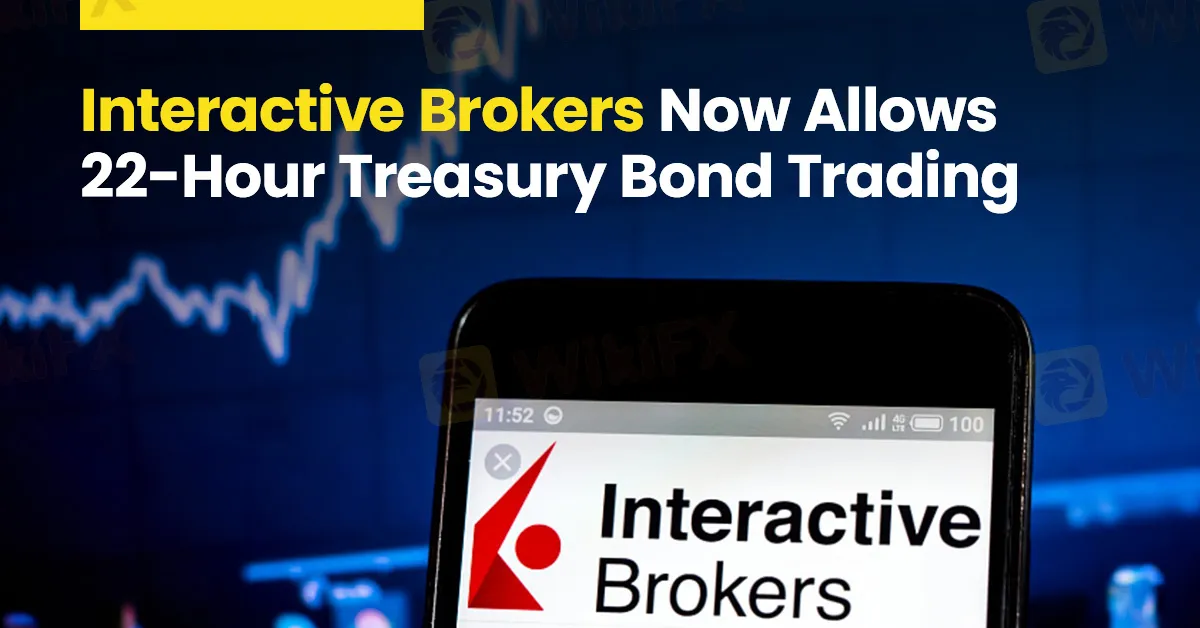简体中文
繁體中文
English
Pусский
日本語
ภาษาไทย
Tiếng Việt
Bahasa Indonesia
Español
हिन्दी
Filippiiniläinen
Français
Deutsch
Português
Türkçe
한국어
العربية
Interactive Brokers Now Allows 22-Hour Treasury Bond Trading
Abstract:Interactive Brokers has expanded trading hours for US Treasury bonds, now allowing trading for 22 hours daily.

Interactive Brokers has expanded trading hours for US Treasury bonds, now allowing trading for 22 hours daily. Previously, clients were confined to nine hours per day, but they can now engage in transactions from 5:00 pm Eastern Time (ET) to 5:00 pm the following day, with a brief hiatus from 5:00 pm to 8:00 pm Eastern Daylight Time (EDT).
In a statement released today (Thursday), the company articulated that this move empowers its global clientele to synchronize trading activities with their respective local time zones and promptly respond to global market developments.

The significance of this initiative was underscored by Thomas Frank, the Executive Vice President of Interactive Brokers, who emphasized that extending trading hours for US Treasury bonds is part of the company's ongoing commitment to broaden its bond offerings by incorporating new coverage, products, venues, and liquidity. He further stated that their goal is to provide clients with the most adaptable and comprehensive trading environment available, stressing the importance of catering to their requirements and offering opportunities to trade on a schedule that aligns with their preferences.
Interactive Brokers boasts an array of bonds, encompassing corporate, municipal, treasury, and non-US sovereign bonds. Moreover, the firm equips clients with complimentary access to the IBKR Bond Marketplace search tool, enabling them to tailor investments according to their unique preferences and objectives.
In a recent development, Interactive Brokers broadened its footprint in Japan by introducing Contracts for Difference (CFD) instruments, facilitating leveraged trading opportunities on shares from the US, Europe, and other global markets.
Presently, the brokerage giant provides a diverse array of trading options, spanning global stocks, options, and futures. The incorporation of CFDs in Japan empowers traders to access financial instruments for both long and short positions.
Interactive Brokers delineated the commission structure for CFD trading, indicating that for US share CFDs, commissions commence at a minimum of $0.0055 per share. These rates fluctuate across different markets, with Japanese share CFDs initiating at 0.033 percent of their trade value, while Singapore share CFDs commence at 0.121 percent.
Despite prevailing market headwinds, Interactive Brokers recently disclosed encouraging financial performance. Revenue surged by 13 percent to $1.2 billion in the first quarter of the year. Notably, commission revenue experienced a robust upswing, reaching $379 million, propelled by a 25 percent surge in customer accounts, now totalling 2.75 million.

Disclaimer:
The views in this article only represent the author's personal views, and do not constitute investment advice on this platform. This platform does not guarantee the accuracy, completeness and timeliness of the information in the article, and will not be liable for any loss caused by the use of or reliance on the information in the article.
Read more

The Ultimate Guide to Automated Forex Trading in 2025
Modern markets are revolutionized by automated trading systems, which now execute 70-85% of all transactions. These advanced automated trading software solutions, commonly called trading robots or Expert Advisors (EAs), leverage algorithmic precision for automatic trading across forex, stocks, and commodities 24/7. By removing emotional interference and executing trades in microseconds, auto forex trading platforms create fair opportunities for all market participants. For those new to automated trading for beginners, these systems provide disciplined, backtested strategies while significantly reducing manual effort.

Will natural disasters have an impact on the forex market?
The forex market is known for its rapid responses to global events, but the influence of natural disasters, such as earthquakes and typhoons, can be less straightforward. While headlines may scream about catastrophic damage and economic disruption, the long-term effects on currency values often depend on a blend of immediate shock and underlying economic fundamentals.

Philippines Deports 29 Indonesians Linked to Online Scam Syndicate in Manila
Online scam groups in the Philippines trick Filipinos into gambling and love scams, from Manila to Bacolod, causing trafficking and pain as police fight back.

Why does your mood hinder you from getting the maximum return from an investment?
Investment decisions are rarely made in a vacuum. Aside from the objective data and market trends, our emotions—and our overall mood—play a crucial role in shaping our financial outcomes. Whether you’re feeling overconfident after a win or anxious after a loss, these emotional states can skew your decision-making process, ultimately affecting your investment returns.
WikiFX Broker
Latest News
How Crypto Trading Transforms FX and CFD Brokerage Industry
UK would not hesitate to retaliate against US tariffs - No 10 sources
FCA Warns Against 10 Unlicensed or Clone Firms
CySEC Warns Against 14 Unlicensed Investment Websites
Top Currency Pairs to Watch for Profit This Week - March 31, 2025
Will natural disasters have an impact on the forex market?
Philippines Deports 29 Indonesians Linked to Online Scam Syndicate in Manila
Navigating the Intersection of Forex Markets, AI Technology, and Fintech
Exposed: Deceptive World of Fake Trading Gurus – Don’t Get Fooled!
AI-Powered Strategies to Improve Profits in Forex Trading
Currency Calculator







